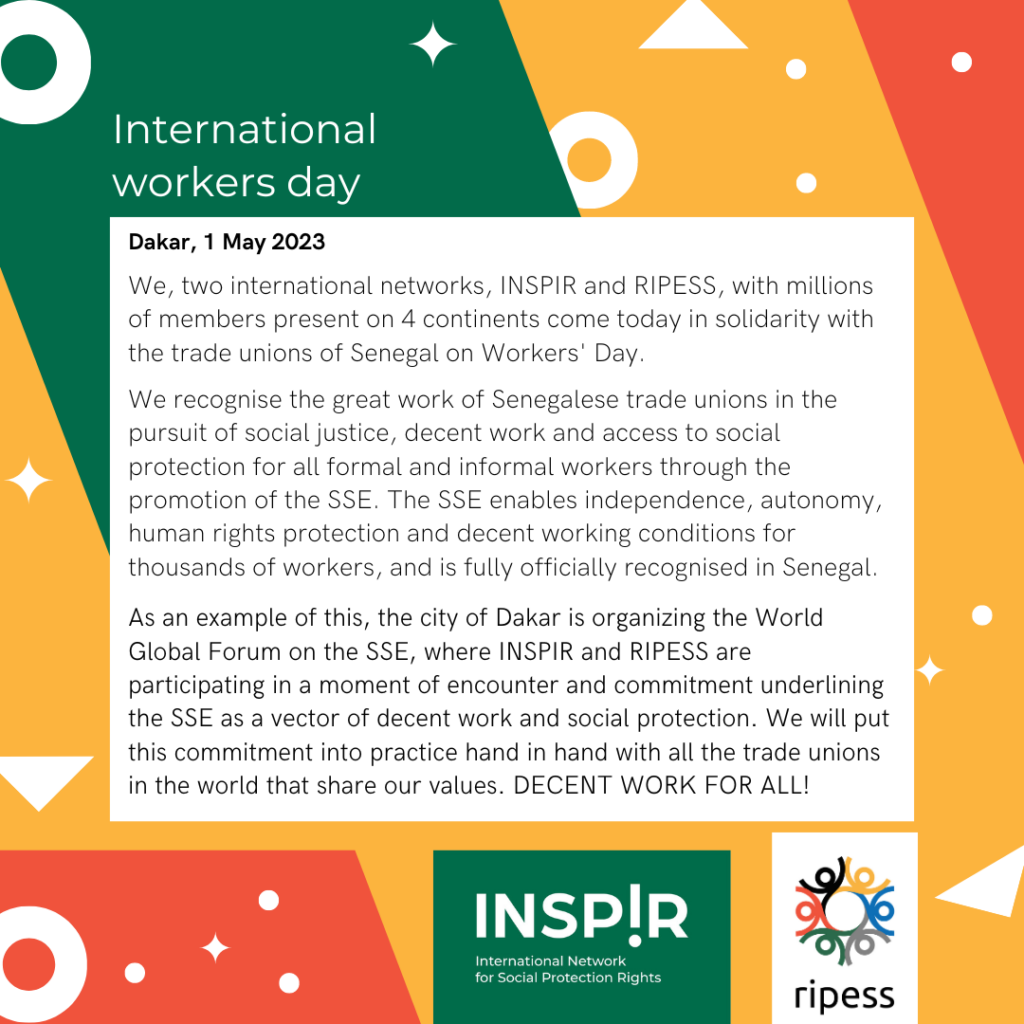n the framework of the celebration day/seminar, held in Brussels today, 18 November 2024, we join together to celebrate the close collaboration between this organisation and RIPESS. Both share a common vision: to promote a social and solidarity economy (SSE) that is a key tool for social justice, sustainable development and poverty reduction. This link has been strengthened over the years thanks to their joint work in global platforms such as the UN Inter-Agency Task Force on SSE (UNTFSSE), where we advocate for a legal framework and public policies favourable to the development of this transformative economy that is already being developed in all continents.
WSM and RIPESS complement each other in the promotion of labour rights, social equity and socio-ecological transition. On 1 May 2023 we launched a communiqué from Dakar, Senegal together with INSP!R. This specific branch of WSM is focused on social protection and consists of about 100 social movements in 24 countries in Africa, Latin America, Asia and Belgium that WSM brought together. These different actors complement each other and all share the same vision and objectives by joining forces from civil society in the global network INSP!R, the International Network for the Right to Social Protection.

In addition, both organisations stress the importance of building strong networks that connect local and global actors, creating an inclusive environment that respects cultural diversity and encourages community participation in the design of sustainable solutions. This anniversary is not only a moment of celebration, but also a call to redouble efforts to ensure that the SSE remains a viable alternative in the face of today’s global challenges.
A commemorative and transformative agenda
WSM’s 50th anniversary is framed in a seminar of reflection and action where, together with allies such as RIPESS, the challenges and achievements of the social solidarity economy (SSE) are explored. The day includes key debates on topics such as the resilience of social movements in the face of systemic crises, strategies to achieve universal social protection, and a collective working space on the challenges of the SSE in the coming years in which the discussion is led by our executive secretary, Sandra Moreno and Maria Alexandra Arguedas, INSP!R partner for Latin America.
Among the keynote speeches, Sandra Moreno, Executive Secretary of RIPESS, addressed the main global challenges of the SSE, such as institutional strengthening, the need to overcome stigmas that limit its attractiveness, and the importance of establishing regulatory frameworks that support its growth. These challenges underline the urgency of consolidating partnerships, improving environmental sustainability, and promoting studies that support the impact of SSE as a viable economic model.
The work of WSM and RIPESS has been very focused on these objectives, with materiality in the collective advocacy work with RAESS in Africa, in the approval of the ten-year SSE plan by the African Union at the end of this summer and in the ECOSOL workshop towhich we were invited last year 2023 to deepen synergies and collective work with RAESS that have ended up forging a much stronger relationship with the International Labour Organization and the African Union, among others.
Lessons from Latin America: The contribution of INSP!R
For their part, in Latin America, the relationship between INSP!R and RIPESS goes back more than 2 years, when they were present, together with ECLAC, during the face-to-face meeting held in Ecuador in November 2022. Since then, work has been developed, including the recently inaugurated Diploma in Public Policies and Popular, Social and Solidarity Economy, with more than 400 people enrolled since the beginning and which could not have been carried out without the support of WSM.
During the anniversary seminar, significant advances in the region were shared, such as the National SSE Roundtable in Bolivia and public policy dialogues in the Dominican Republic that have promoted the recognition of the SSE as a driver of social and economic development in the regions. These actions, coordinated with RIPESS LAC and ECLAC, demonstrate the potential of the SSE to transform local realities, highlighting the impact of training, intersectoral collaboration and political advocacy.
In addition, other inspiring projects were presented, such as the proposal in Guatemala to formalize and strengthen the SSE, linking social actors, cooperatives and governments. These experiences underline the importance of strengthening the role of the SSE for social inclusion and in the fight against inequalities worldwide.
Congratulations WSM!




